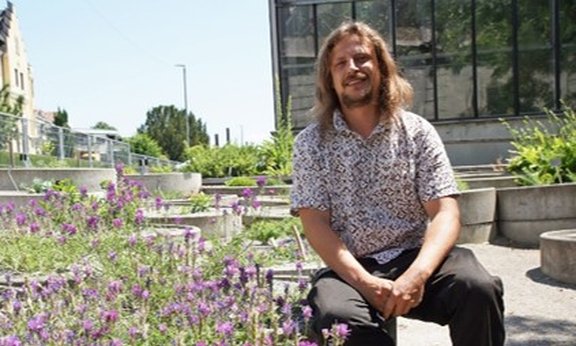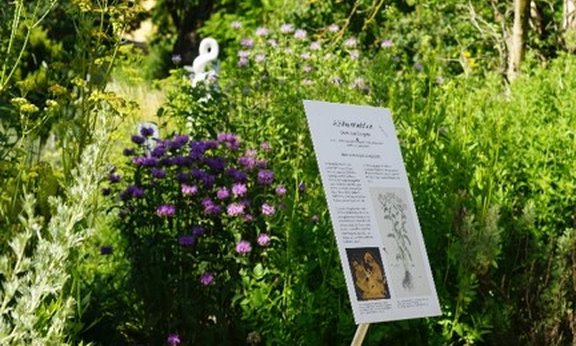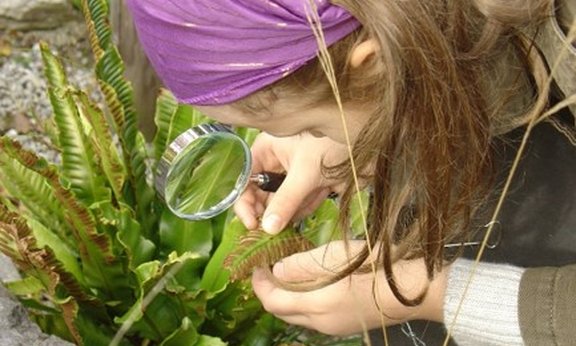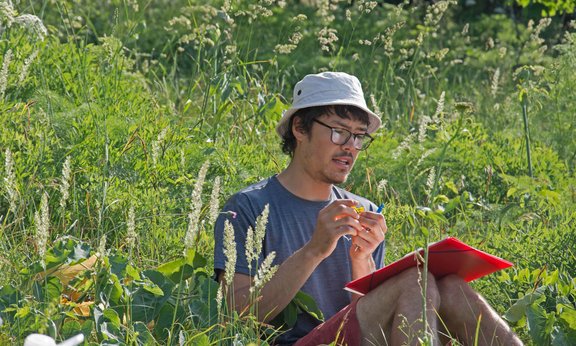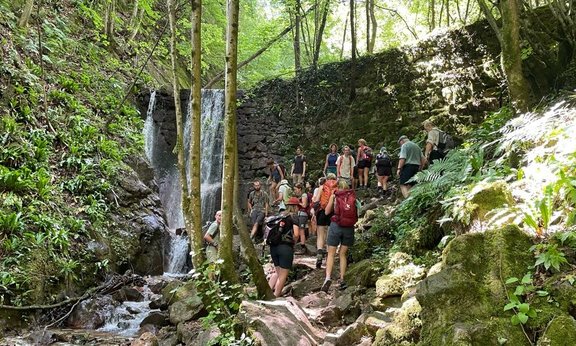Studium am Institut für Botanik
Studien
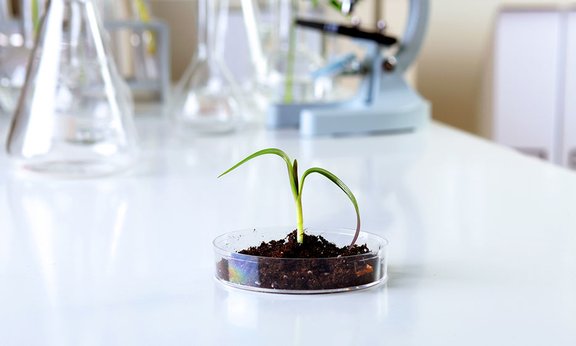
Bachelorstudium Biologie
Das Bachelorstudium Biologie vermittelt eine breite Ausbildung in allen Kernbereichen der Biologie.

Masterstudium Botanik
Das Masterstudium vermittelt umfassende Kenntnisse der Biologie von Pflanzen, vom Molekül bis hin zur Ökosystemebene.
Unsere Studierende
Serviceseiten für Studierende
Biopage.info - Portal für Biologiestudierende der Uni Innsbruck
Newsletter für Studierende - aktuelle Informationen des Institutes für Botanik
Infoveranstaltung Master Botanik 2024
Botanik Relaxed Exkursionen
Wir veranstalten Exkursionen und Bestimmungsabende abseits der Curricula. Nähere Infos dazu finden Sie hier.
Exkursions- und Praktikums-Protokolle von Studierenden
Viele unserer Lehrveranstaltungen finden im Freien statt. Protokolle dazu sind hier zu finden.
Warum Botanik?
Die heutige Atmosphäre auf unserem Planeten wurde von Cyanobacterien, Algen und höheren Pflanzen verändert: über Milliarden von Jahren haben sie die Luft mit Sauerstoff angereichert. Das passiert im Rahmen der Photosynthese, bei der die Pflanzen auch Kohlendioxid aufnehmen. Pflanzen sind damit auch Ausgangspunkt der meisten Nahrungsketten und somit zentrale Komponenten in allen Ökosystemen unserer Erde.
Pflanzen sind unsere Nahrungsgrundlage. Wir nutzen aber auch unzählige andere pflanzliche Produkte im Alltag – man denke etwa an Holz als Bau- und Brennstoff, Papier, Baumwolle, Biokraftstoffe, Genussmittel wie Tee, Kaffee, Schokolade oder auch an pflanzliche Arzneimittel. Auch die fossilen Brennstoffe sind pflanzlichen Ursprungs.
Pflanzen sind Lebewesen, die sich von Mensch und Tier grundlegend unterscheiden. Die Ernährung durch Photosynthese, die nicht-mobile Lebensweise und die Ausbildung von starren Zellwänden bedingen faszinierende und unglaublich vielfältige Lösungen für ihr Leben und Überleben in der Umwelt.
Was bieten unsere Studien?
Unsere Studien decken ein breites Spektrum an Fachgebieten ab. Unsere Lehrveranstaltungen und Abschlussarbeiten beschäftigen sich unter anderem mit Biochemie und Zellbiologie, Pflanzenphysiologie und -ökologie, Evolution und Biodiversität, Vegetations- und Populationsökologie, Pollenanalyse und Archäobotanik, Nutzpflanzen und Forstökologie oder Klimawandel und Naturschutz.
Eine optimale Betreuung unserer Studierenden und ein kollegiales Miteinander sind uns ein zentrales Anliegen. Wir versuchen unsere Studierenden bei Lehrveranstaltungen und Abschlussarbeiten bestmöglich zu unterstützen.
Unsere Lehrenden sind auch als WissenschaftlerInnen aktiv und geben in den Lehrveranstaltungen Einblicke in laufende Forschungsprojekte und -ergebnisse. Auch die Abschlussarbeiten haben zumeist direkten Bezug zu laufenden Forschungen.
Unser Institut verfügt über eine moderne Laborausstattung und vielfältige Möglichkeiten für Freilandstudien. Der Botanische Garten, der Alpengarten Patscherkofel und viele weitere Feldstationen freuen sich auf engagierte Studierende ;)
Unsere Studierenden haben die Möglichkeit, unterschiedlichste Methoden zu erlernen. Unter anderem bilden wir für molekularbiologische und biochemische Techniken, chromatografische Verfahren und Massenspektrometrie, dendrochronologische und physiologische Methoden, Methoden der Populations- und Pollenanalyse sowie mikroskopische und bildgebende Verfahren aus.
Wir sind mit internationalen und nationalen KooperationspartnerInnen in Forschung und Industrie stark vernetzt. So können wir unseren Studierenden vielfältige Kontakte in einem interdisziplinären Umfeld bieten, was auch für die spätere berufliche Laufbahn vorteilhaft ist.
Das Institut für Botanik ist in die universitären Forschungsschwerpunkte Alpiner Raum und Molekulare Biowissenschaften eingebunden. Im Rahmen des Doktoratsstudiums kann auch das Innsbruck Doctoral College Alpine Biology and Global Change absolviert werden.
Wir arbeiten mit behördlichen, institutionellen und privatwirtschaftlichen Partnern, etwa in den Bereichen Naturschutz, Land- und Forstwirtschaft oder Pharmazie zusammen. Damit können wir unseren Studierenden Einblicke in die Praxis und wertvolle Kontakte für die spätere berufliche Laufbahn vermitteln.
Berufsaussichten nach dem Abschluss
AbsolventInnen, die ihre Abschlussarbeit (Master, Diplom oder Doktorat) am Institut für Botanik durchführen, bietet sich eine breite Palette an Berufsmöglichkeiten. Sie erhalten eine solide Basis sowohl für eine wissenschaftliche Karriere als auch für andere Berufe, welche eine naturwissenschaftliche Ausbildung fordern. Neben universitären Tätigkeiten in Forschung und Entwicklung sind SpezialistInnen beispielsweise in den Bereichen Naturschutz und Landschaftsplanung, pharmazeutische und chemische Industrie, oder Museums- und Naturpädagogik gefragt.
Von der fundierten botanischen Ausbildung profitieren auch unsere zukünftigen LehrerInnen. Eine Befragung von AbsolventInnen, die ihren Master zwischen 2013 und 2018 am Institut für Botanik abgeschlossen haben, zeigt die Vielfalt der Berufsmöglichkeiten.
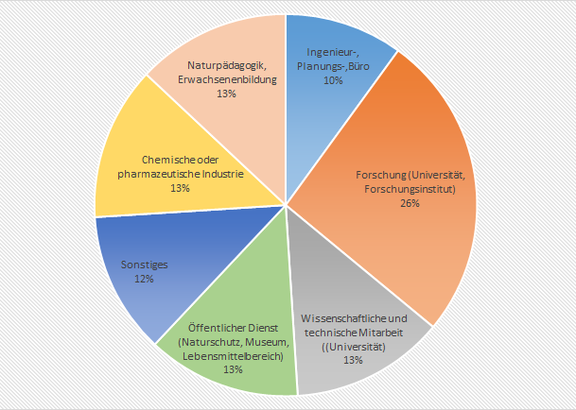
Antworten auf die Frage "In welchem Berufsfeld sind Sie derzeit tätig?"
Die Antworten unserer AbsolventInnen auf die Frage "Im Rückblick auf Ihr Studium, was sehen Sie als positiv und für Ihren Berufsweg förderlich?" ergaben folgendes Bild:
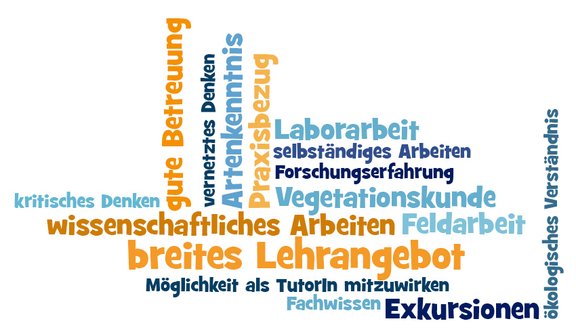




Guideline for incoming master students – Faculty of Biology
Welcome to the University of Innsbruck– we wish you all the best for you master study at the Faculty of Biology!
This document is an unofficial guide for incoming master students at the University of Innsbruck, i.e. students with a Bachelor degree obtained abroad or on another University in Austria. We hope this guide will provide some orientation at the beginning of your master study, and help you navigate through all formalities. Please note that all provided links to University webpages will direct you to the English version. You can easily switch to the German version by using the respective button at the top of each webpage.
This guide was written in 2022. Non-study related text modules were taken from the PhD guide for students at the faculty of biology. It cannot be guaranteed that the information given here is completely correct, so please make sure to read the legally binding texts from the official sources as well. For detailed information, deadlines and admission periods please have a look at the official website of the University of Innsbruck. Important information regarding the study of biology including job offers can also be found at the biopage. If you have any questions or require help, you can contact your students’ representatives (stv-biologie@oeh.cc), or the Dean of Studies of your faculty.
PDF Guideline incoming master students
The University of Innsbruck offers five master´s programmes in Biology: Botany, Ecology and Biodiversity, Microbiology, Molecular Cell and Developmental Biology and Zoology. Detailed information on each study programme can be found under https://www.uibk.ac.at/en/programmes/ . All master´s programmes comprise 120 ECTS-Credits, which is equivalent to a study period of two years. After successfully completing your study, you will be awarded the academic title ‘Master of Science (MSc)’.
To enroll in a master´s programme at the University of Innsbruck following is required:
- a relevant bachelor´s degree or equivalent
- a language certificate in case German is not your mother tongue. As German is the language of instruction for all master´s in Biology you need to proof your language skills. For the application, German language skills at level A2 are necessary, for admission at level B2. For detailed information and acceptable certificates, please refer to https://www.uibk.ac.at/studium/anmeldung-zulassung/sprachnachweise.html.en.
The academic year at the University of Innsbruck is divided into two terms: October – January and March – June. Please be aware that the application and admission to a master´s programme is only possible at defined periods. Current deadlines are found under http://www.uibk.ac.at/studium/organisation/studium/index.html.en.
In the following, information on how to enroll as a master student is provided. To ensure if details are still correct please also check the official website of the University of Innsbruck: https://www.uibk.ac.at/studium/anmeldung-zulassung/masterstudium/index.html.en.
4.1 EAA versus Non-EAA citizens[1] and stateless persons
Regardless where you come from, you need to first apply online to the desired Master´s programme (instructions see below). However, depending on your nationality different deadlines apply. For current deadlines see point 3. Please take care to not submit the application shortly before the deadline, as admission in the desired term can then not be guaranteed!
4.2 Documents required
Depending on your nationality and background different documents are required for the admission. Please note that foreign-language documents need to be translated into German or English – if applicable with proper certification. Also, be aware that intermediate certificates or confirmations, temporary transcripts etc. are not accepted. Detailed information on the documents required are provided under https://www.uibk.ac.at/studium/anmeldung-zulassung/masterstudium/index.html.en#documents and examples can be found under https://lfuonline.uibk.ac.at/vispubup/lfuonline.help?id_in=36.
4.2.1 EAA citizens
- Notice confirming awarding of Bachelor's Degree
- Transcript of records
- Diploma supplement
- Curriculum vitae
- Language certificate (if necessary; see point 2)
- Valid Passport or Identity card
- Photograph
- E-card (if available)
4.2.2 Non-EAA citizens and stateless persons
- Notice confirming awarding of Bachelor's Degree
- Transcript of records
- Diploma Supplement
- Curriculum Vitae
- Language certificate (if necessary; see point 2b)
- Proof of special University Entrance Qualification*
- Valid Passport or Identity card
- Photograph
- E-card (if available)
*Attention: This is not the Bachelor´s certificate but a confirmation of your University hat you have the right to study there. Please visit https://www.uibk.ac.at/studium/anmeldung-zulassung/nachweis-der-besonderen-universitaetsreife.html.en for detailed information.
4.3 Procedure
- Choose your desired master´s programme on https://www.uibk.ac.at/en/programmes/ and start your online application by clicking the button ‘Apply Online’.
- You will be asked to create an LFU:online account. This is the student portal of the University of Innsbruck where you have access to all relevant personal information regarding your study.
- Choose the semester in which you want to start your studies, fill out all required forms, upload all documents required. You do not need to complete and submit your application at once. Prior to submission you can access and change your details in LFU:online anytime.
- Once submitted you have to wait until your application is decided (takes days to several weeks!). In any case you will then be notified.
- If your notification has been approved, the Admission Department will check all documents and grant you admission to the University. From this moment on you are an official student of the University of Innsbruck. In some cases, you will be asked to pay a personal visit to the Admission Department of the University of Innsbruck for enrolment and bring the printed (positive) decision and all original documents and photocopies of all original documents.
- Upon acceptance you will also have to pay the tuition and/or the Austrian Student´s Union fee. For students from the EU and some others, tuition is waivered. However, there is a small fee for everyone: Twice a year (at the beginning of each term), every student is required to pay a fee that helps financing the local students’ representation (ÖH). The payment of this fee is necessary in order to continue your enrollment. The fee changes every year but is always very small (about 20€). Included is a third-party insurance and accident insurance, which means you have automatic coverage through the ÖHwhile on campus. You can pay the fee either online by bank transfer, or at the Service Points located on each campus. You can check whether you have paid the fee on LFU:online by going to “my profile” and then ”my tuition fee”. For more information on LFU:onlineand the ÖH, see below.
[1] EEA = European Economic Area (member States of the European Union (EU) and the signatory states of the European Free Trade Association (EFTA; Liechtenstein, Iceland and Norway).
The standard duration of all master´s programmes in biology is 4 semesters or 120 ECTS-Credits. For information on courses provided please refer to the current curriculas.
Botany
Ecology and Biodiversity
Microbiology
Molecular Cell and Development Biology
Zoology
Please note: if you are asked to take additional courses from the Bachelor´s Programme, you will find relevant information in the Curriculum for the Bachelor´s Programme Biology under https://www.uibk.ac.at/studium/angebot/ba-biologie-19w/index.html.en.
5.1 Course registration
You are required to register for courses online, through the LFU:onlinesystem. To do so, access the course information on the university calendar (called “courses” in the main menu of LFU), and sign up for the course. For some courses, multiple groups at different times may be available.
The start date and deadline for the registration may differ between different courses. Registration generally opens around two months prior to the beginning of the term, and may end some weeks before the course actually starts. Refer to the course information on the university calendar for the individual deadlines.
6.1 Online services
The most important online services of the university are accessible from the “Quick links” menu on the university website. Among others, they include:
- LFU:online: Each student at the University of Innsbruck has an account on LFU:online. In your role as a student, this platform allows you to manage your study affairs. For instance, you can access the university calendar (the list of courses), register for courses, view exam results, pay your ÖH fee, generate study confirmations, and more.
- OLAT: This is an eCampus platform that provides access to digital content that might be distributed by the lecturer in courses you attend. You might not have access to this service automatically, see below for details. The OLAT group pertaining to a particular course can for example be accessed through the entry of the course in the university calendar in LFU:online.
- Webmail: You can access your university e-mail account in the browser.
A full list of the services offered by the ZID (“Zentraler Informatikdienst” – the IT department of the university) is available online. The ZID for example offers free or discounted software licenses.
In some cases, you might not have access to some or all of the ZID services automatically after starting as a student. In this case, you can request access using a form, or contact the “Benutzerservice” at the ZID office in the basement of “Architekturgebäude” on Campus Technik.
6.2 Scholarships and financial support
The University of Innsbruck offers performance-based and needs-based scholarships. Further information on these scholarships, for instance if you are eligible for a scholarship, how to apply for it, and the application dates can be found online. Applications for performance-based scholarships can be submitted once a year, those for needs-based scholarships twice a year.
6.3 ÖH
The “Österreichische Hochschülerschaft” (ÖH), or Austrian Union of Students is the legal body of study representatives. Founded in 1946, the ÖH is represented on three different levels:
- each study program
- each university
- Austria-wide
The ÖH acts as the students’ political and public representation and intends to improve each student’s everyday life. As soon as you are enrolled in your master study, you are automatically part of the ÖH. Please visit the national ÖH website and the website for Innsbruck for further information.
6.4 ÖH services
The ÖH features different departments for different student needs. There are departments for social inquiries, for non-Austrian students, for women and equal treatment, for legal consultations, and others. Further information of each department can be found here. The ÖH also offers psychological consultations.
6.5 Studia
Studia is a private company residing within the university premises. It offers specialized services like printing, digitalization, bookbinding and other publication services, and sells books and printed lecture notes. In particular, you will be able to print posters for conferences and your thesis. They maintain several shops, for instance on Campus Technik.
6.6 USI
The University of Innsbruck offers good sports facilities. Located close to the Innsbruck Airport, the University Sports Institute (USI) is a very cheap option for all kinds of sports and exercising. Enrollment is at the beginning of each semester via the USI webpage. A small fee, usually ranging from around 20 – 50€ has to be paid per course.
7.1 Registration of residence (“Wohnsitzmeldung”)
You are required by law to register at the town magistrate of your current place of residence within three days of moving there. As long as you stay in a hotel, the hotel administration will register you automatically. Upon moving to private accommodations, say into a rental flat, the responsibility falls to you.
To register your new address of residence, you need to fill in a form and file it in at the town hall (office of residence administration, “Amt für Melde- und Einwohnerwesen”). Visit the website of the Innsbruck town magistrate, or the help website of the Austrian government to download the form and to obtain more information.
Note: you require the signature of your landlord*lady!
7.2 Certificate of registration (EU citizens - “Anmeldebescheinigung”)
If you are a citizen of the EU (and associated states), but foreign to Austria, you are required to obtain a certificate of your residential status under EU legislation, within four months of your arrival in Austria. This is also done at the residence administration in the town hall. When registering your residence (see above), you will be given instructions on how to proceed. You can also obtain more information on the help website of the Austrian government.
7.3 Visa (non-EU citizens)
Please refer to the appropriate authorities, for instance your nearest Austrian consulate.
7.4 Radio & TV license fee (“Rundfunkgebühren”)
If you own devices that receive radio or TV programs (except car radios), you are likely required to register them with the GIS (“Gebühren Info Service”) and pay a small monthly license fee. The registration can be filed online on the GIS website.
7.5 Public transport
Innsbruck and the ÖBB (“Österreichische Bundesbahnen”) maintain an extensive public transport system (city buses, tram, intercity buses and intercity trains). Refer to IVB for transportation in the city, to Postbus for regional buses, and to ÖBB for intercity trains. In addition, there are several companies offering intercity and international bus services.
Also note that IVB offers an inexpensive bike sharing service called “Stadtrad”, which is a great way to be mobile in Innsbruck without having to buy a bike locally.
As a student (under the age of 27), you are eligible for a discounted ticket valid for six months on IVB vehicles.
7.6 Looking for an apartment?
The ÖH runs a popular website to find rooms in shared flats, studios, or whole apartments in and around Innsbruck. In case you cannot find the right place to stay, there is also www.wg-gesucht.de or the facebook group ‘WG & Wohnung Innsbuck gesucht’. If you are looking for an apartment using these websites, you usually do not have to pay fees for a housing agent.
7.7 Medical doctors
You can choose between medical doctors (MD) who have a contract with your health insurance company (referred to as “Kassenärzte”) or private MDs. If you chose a MD that has a contract with your health insurance company, you are not required to pay anything for your visit, or just a reduced amount.
In case of urgent medical predicaments, you can go to the emergency room at any hospital. Usually, treatment in hospitals are billed directly to your insurance company.
[1] www.innsbruck.gv.at
[2] https://www.help.gv.at/Portal.Node/hlpd/public/content/18-1/Seite.180201.html
[3] https://www.oesterreich.gv.at/themen/leben_in_oesterreich/aufenthalt/4/2/Seite.120810.html
[4] www.gis.at
[5] www.ivb.at
[6] www.postbus.at
[7] www.öbb.at
[8] www.stadtrad.ivb.at
[9] www.ivb.at/de/fahrgast/tickets/uebersicht-tickets.html
[10]www.oehboersen.at

